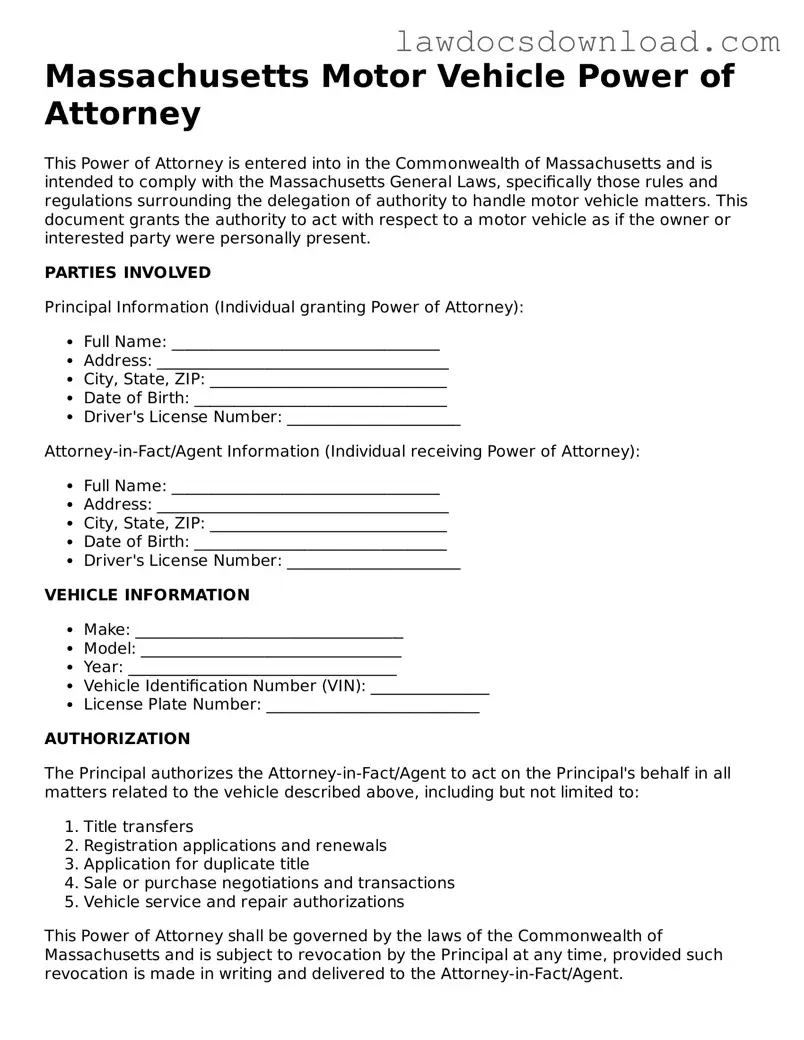When it comes to delegating authority over one's motor vehicle affairs in Massachusetts, navigating the Motor Vehicle Power of Attorney (MV POA) form can often be tricky, leading to errors that may invalidate the document or hinder its intended use. Understanding these common pitfalls can help individuals ensure their forms are correctly completed, reflecting their wishes accurately and legally.
Not Using the Proper Form: The first misstep occurs before pen to paper - using an outdated or incorrect form. The Massachusetts Registry of Motor Vehicles periodically updates its forms, including the MV POA, to reflect current laws and regulations. Utilizing an outdated version can lead to rejection, thus it’s pertinent to ensure the most current form is in use.
Omitting Required Information: Skipping fields or providing incomplete information is a common error. Each section of the form serves a purpose, from the vehicle identification number (VIN) to specifics about the principal and agent. Leaving sections blank or partially filled may render the form ineffective, as complete data ensures legal clarity and operational usability.
Using Non-Official Terms: Another mistake lies in the use of informal or non-official terms, especially when identifying the vehicle or the parties involved. Legally accurate descriptions and formal titles ensure there's no ambiguity about the subjects of the POA, maintaining its legality and effectiveness.
Failing to Specify Powers Granted: The precise nature of the authority being granted must be clearly outlined in the MV POA form. Vague descriptions or assumptions about "standard" powers can lead to misunderstandings and enforcement issues. Whether it's for a single transaction or broader management tasks, specificity is key.
Incorrect Signatures: Signatures are the seal of consent and agreement, requiring proper execution. This means the principal must sign in the presence of a notary or other authorized official, depending on the state's requirements. Incorrectly signed forms, whether due to missing signatures or improper witnessing, are a significant setback.
Forgetting to Date the Document: An often overlooked but critical detail is dating the document. A missing date can question the document's validity and relevance, especially if the POA is ever challenged or scrutinized for its timeliness.
Not Notarizing the Document: While not always mandatory, failing to notarize the MV POA can create complications. Notarization adds a level of authenticity and legality, becoming especially crucial when the document is used in significant transactions or if its validity is questioned.
Oversight in Making Copies: Finally, neglecting to make copies of the MV POA for personal records or to share with relevant parties is a common mistake. Having access to duplicates ensures that evidence of the authorized power is readily available if the original is misplaced or challenged.
Correctly filling out the Massachusetts Motor Vehicle Power of Attorney form is vital for ensuring that your vehicle-related decisions are carried out according to your wishes. Avoiding these errors can save time, money, and stress, allowing the vehicle matters to proceed smoothly and legally.

